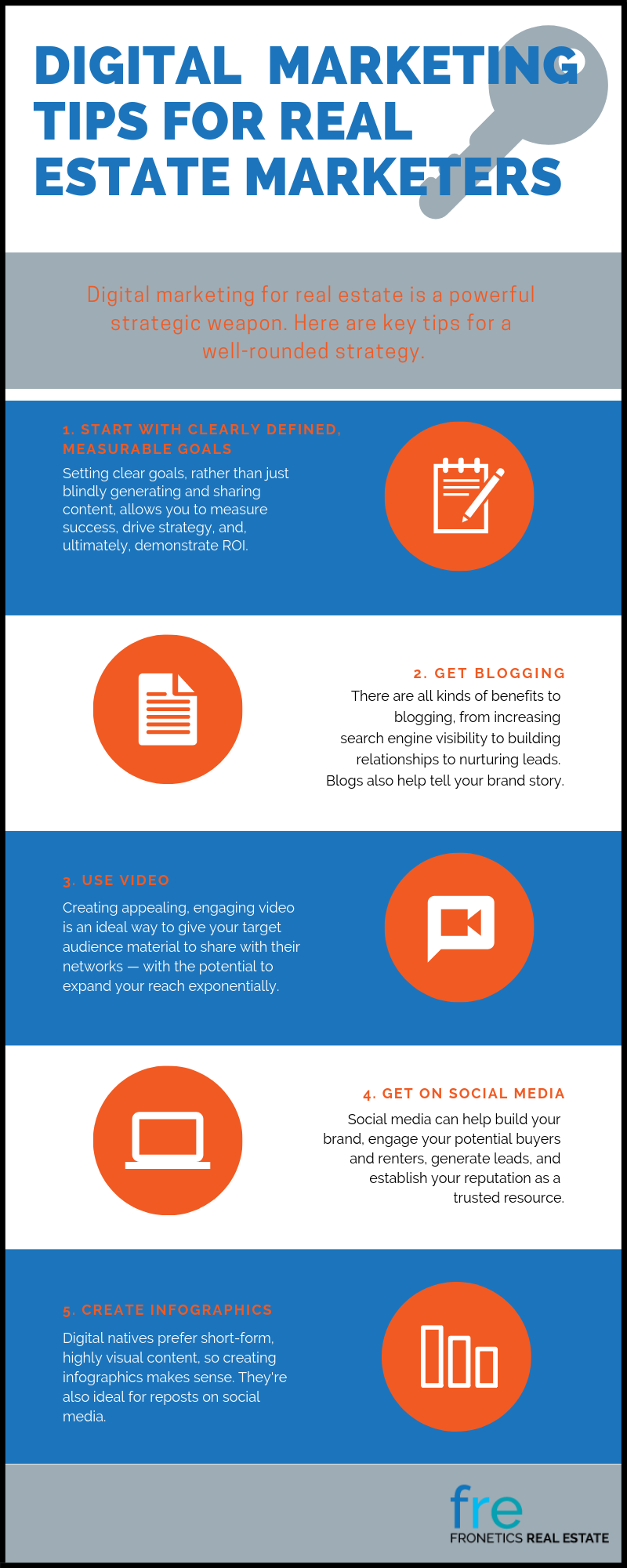Posts Tagged "content marketing ROI"

How to Explain Content Marketing ROI to Win (or Keep) Buy-In
Proving content marketing ROI can seem like a daunting task for real estate marketers, but finding and analyzing the right metrics effectively is crucial to measuring ROI, and ensuring buy-in.
Highlights:
- Talking about marketing as if it’s an art rather than a science does a disservice to your department and to your brand as a whole.
- Make sure your executives understand the nature and goals of your marketing strategy.
- The right metrics will help you track ROI, and justify executive buy-in.
Accountability and showing a solid return on investment (ROI) is everything when it comes to ensuring that your business is allocating adequate resources to marketing your brand and properties. And let’s face it, too many executives think that marketing is, at best, about supporting sales or, at worst, a department that exists to paste logos onto coffee mugs.
Writing for Marketo, Content Marketing Specialist Bryson Runser points out that as an “informed marketer, it’s your duty to infuse credibility into your organization by way of meaningful metrics that tie directly to your top and bottom line.” While the C-suite famously cares nothing about internal marketing metrics like Facebook likes or click-through rate, metrics are crucial to the success of marketing real estate. Not only that, effective use of metrics is the best way to establish the function and importance of the marketing department within your organization.
Get your audience on the same page
Before we dive into the nitty-gritty of proving content marketing ROI for the C-suite, it’s important to acknowledge that content marketing hasn’t been around all that long. It’s only in the past decade that the real estate industry has been reshaped by digital and content marketing. This means that you can’t necessarily count on the fact that your organization’s higher-ups understand exactly what content marketing is.
Take the time to make sure your executives understand not only the definition of content marketing, but also how it will help your real estate brand grow and your business achieve various specific goals. Content marketing expert Julia McCoy suggests using approachable metaphors, such as “content marketing is a vehicle, and content marketing strategy is the engine. The vehicle takes you to your destination only if the engine is in good shape.”
Numbers don’t lie
One of the main aspects of the “crisis of accountability” is a problematic view of what marketing is: “if marketing leaders insist that marketing is an art and not a science,” Runser writes,”then the department will remain isolated from other groups.” Establishing that content marketing is not only dependent upon data, but can also be measured, is key to changing that perception.
“Marketing must be able to justify their expenditures as investments in revenue and growth,” writes Runser. Of course, it’s partly a chicken-and-egg issue, since getting to the point of being able to talk about expenditures in this way does require investment from the top of your business.
We know that measuring the impact of content marketing can be tricky. But it’s not impossible. The first step is determining the right metrics to track. For more detailed ideas and analysis, check out this post, which details how to determine and use metrics for real estate marketers to measure the impact of content marketing on brand awareness.
Why are you reporting?
Collecting and reporting on content marketing ROI can feel like you’re spinning your wheels and collecting meaningless data. But it’s crucial to keep metrics focused on the main goal: to enable you and your business to make decisions that improve your marketing efforts. “This is the difference between backward-looking measurement and decision-focused management,” says Runser.
Data for the sake of data doesn’t do any good. Data should be used to shape insights, which in turn informs priorities and actions for your business. We’ve written before about the dangers of vanity metrics, which have no bearing on your bottom line but can give you an inflated sense of success.
It’s very easy to fall into the trap of meaningless data collection, especially when marketers are often struggling to prove their worthiness to the C-suite. But using metrics to improve marketing’s performance will go a long way towards winning over executives. “[B]y aligning data measurements with your company’s strategic objectives,” Runser writes, “it will be easier to allocate resources by revenue impact.”
Related posts:
- What Metrics Should You Track in Real Estate Marketing?
- The Metrics You Should Be Measuring in Real Estate Marketing (Hint: Not Vanity Metrics)
- Social Media Can Be a Strategic Weapon in Real Estate Marketing
Posts Tagged "content marketing ROI"

Infographic: 5 Tips to Make Digital Marketing for Real Estate Count
Digital marketing for real estate is a powerful strategic weapon. Our infographic gives you some key tips for a well-rounded strategy.
Highlights:
- 88% of all home buyers use the internet to collect information, and for 43%, an online search is their first step.
- When you kick off digital marketing for real estate, setting clear goals, rather than just blindly generating and sharing content, allows you to measure success, drive strategy, and ultimately, demonstrate ROI.
- Video is an ideal way to give your target audience material to share with their networks — with the potential to expand your reach exponentially.
As the realm of marketing has undergone a seismic shift in the past decade, digital marketing for real estate has taken off. According to the National Association of Realtors, 88% of all home buyers use the internet to collect information, and for 43%, an online search is their first step. Real estate marketers are increasingly targeting their efforts on digital media, and content marketing is one of the best ways to do this.
Our infographic below represents our favorite digital marketing tips for real estate marketers. Read on for ways you can use this powerhouse tool to market your brand and properties.
Digital marketing for real estate — 5 tips
1) Start with clearly defined, measurable goals
Effectively selling or leasing property requires a comprehensive, data-driven approach to marketing — which means starting with clearly defined, measurable goals. Are you looking to generate more leads? Raise brand awareness? Grow your social media presence? When you kick off digital marketing for real estate, setting clear goals, rather than just blindly generating and sharing content, allows you to measure success, drive strategy, and ultimately, demonstrate ROI.
2) Get blogging
Blogs help you sell real estate. Period. There are all kinds of benefits to blogging, from increasing search engine visibility to building relationships to nurturing leads. The more you publish, the higher you’ll rank with search engines. And every time you publish a blog post, you increase the chances that a user searching online for real estate will find your website.
Blogs also help tell your brand story. They help buyers imagine themselves in your space. They nurture leads and build trust among potential buyers. In a recent audit of a client’s website, we found that people who read the blog converted at an almost 30% higher rate than other web traffic. That’s significant.
3) Use video
If you’re a frequent reader of our blog, you’ll know that we’ve been writing about the astronomical rise of video in real estate marketing for a while now. We can’t stress it enough: video is here to stay, and it’s time your business starts embracing it as a highly effective content marketing tool.
Part of what makes video such an appealing form of content is its inherent shareability, which drives organic traffic. Getting your content and properties out to your base audience is one thing but empowering that audience to be your ambassadors is a huge next step. Creating appealing, engaging video is an ideal way to give your target audience material to share with their networks — with the potential to expand your reach exponentially.
4) Get on social media
Real estate is a people business. That’s why you should leverage a marketing tool that is also all about people: social media. If you have not begun developing social media strategies for your real estate business, now is the time to get started.
Consider for a minute that in 2017, 81% of Americans had at least one social media profile. And the numbers are projected to continue skyrocketing: by 2020, 200 million people just in the U.S. are estimated to be on social media. Used wisely, social media can help build your brand, engage your potential buyers and renters, generate leads, and establish your reputation as a trusted resource.
5) Create Infographics
Infographics can be one of the most effective mediums for digital marketing for real estate. We know that digital natives, who make up the majority of real estate buyers today, prefer short-form, highly visual content. So, infographics make a lot of sense when it comes to speaking their language. Infographics are also prime candidates for reposts on social media.
Since the text in infographics isn’t readable by search engines, you can make the most out of your content and bump up your SEO by including a transcript of your text with your graphic, ideally at least 350 words.
Final thoughts
Online searches have changed real estate marketing for good. In fact, the possibilities that digital marketing offers are varied, constantly evolving, and exciting. Savvy real estate marketers are using quality content to raise brand awareness, improve SEO, build relationships, and generate leads.
Related Posts:
- A Visual Guide to Social Media Posting Frequency for Real Estate
- 10 Social Media Statistics for Real Estate Marketers 2018
- 10 Quick Ways to Grow Brand Awareness




